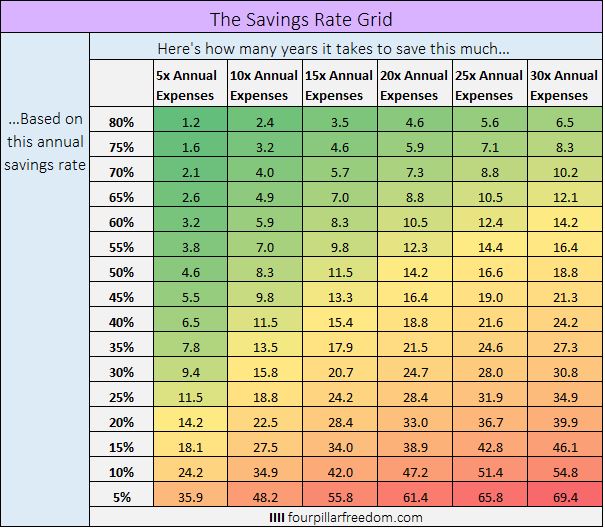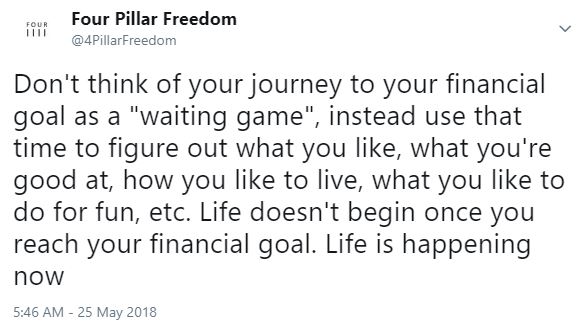
3 min read
A couple days ago I shared the Savings Rate Grid, which shows how long it takes to save a certain amount based on your annual savings rate:

The grid assumes you start with $0 and earn 5% annual returns on investments.
Notice how even with a high savings rate, it will likely take years (if not decades) to reach your financial goal.
It’s easy to view these years leading up to your financial goal as a “waiting period” in which you’re just counting down the days until you’re free from your pointless day job.
It’s easy to fall into a monotonous schedule of working during the day, watching Netflix in the evening, and relaxing over the weekend before Monday rolls around again.
It’s easy to spend your free time daydreaming about how nice life will be once you have the means to ditch the 9-5 grind.
But I think there’s a better way to spend these years. Instead of viewing them as a waiting period, view them as an opportunity to develop self-awareness.
Use these years to become acutely aware of what you like and dislike. And I don’t mean surface-level stuff like “I hate my day job and I love traveling.” I mean really strive to get to know yourself.
Do you prefer living in a house or an apartment?
Do you like spending time cleaning? Doing yard work? Working on home improvements?
Do you enjoy working out at a public gym? Or do you prefer to exercise alone?
What books do you find yourself gravitating towards? What subjects pique your interest?
Do you prefer urban or rural life?
What type of podcasts are you drawn towards?
What type of work environment do you like? Even if you dislike your job as a whole, are there parts of it that you actually enjoy?
Do you prefer forests or beaches? What type of environments do you like?
Do you enjoy cooking? Painting? Writing? Drawing? Playing music?
It almost sounds silly, but most of us don’t actually know ourselves deeply. We’re not hyper-aware of what puts us in good and bad moods.
To combat this, I personally keep a folder full of notes in my phone to track what makes me happy, stressed, motivated, sad, etc. Here are a few examples of notes I have made over the past few months:
“Yoga feels like a chore after work, not that fun anymore”
“I keep looking up data visualizations in my free time. I should pursue that more”
“Love the feeling of finishing a good blog article. Doesn’t even matter if it gets page views, the writing itself is a joy”
“HATE pointless meetings at work”
“Love financial podcasts on morning commutes”
“Writing at coffee shops on Saturday mornings puts me in a great mood”
“Can’t stand cleaning the apartment. Would rather spend that time doing pretty much anything else”
“Always happy after a long hike”
The more notes I keep, the more I begin to see exactly what I like and dislike. And I have found three major benefits of developing this self-awareness:
1. Increased self-awareness helps me align my spending with things that bring me joy. I’m okay with spending money on a keyboard piano, a temporary Hulu subscription for the NBA playoffs, a music festival ticket, and Chipotle burritos because all those things bring me joy. I spend far less on categories like housing and clothing because I prefer to live in a small place and I like having simple clothing choices.
2. Self-awareness has helped me develop a new income stream. Once I realized that blogging brought me so much joy, I started writing more and more. Over time, this interest has actually turned into a new income stream.
If I never became aware of how happy blogging made me, I may have quit early on because I wasn’t getting many page views. But once I stopped writing for views and started writing for enjoyment, ironically the views increased to a point where I could earn money from blogging.
3. When I finally do have the financial means to quit my day job, I already have a good idea of how I would like to spend my time. I think the mistake many people make is waiting until they’re financially free to pursue their interests. Personally, by pursuing my interests on the way to my financial goal, I’m figuring out exactly how I like to spend my free time before I have the extra free time that comes from not having a job.
In closing, here’s a 280-character summary of this post:

- The Ad Revenue Grid - August 6, 2021
- Attract Money by Creating Value for a Specific Audience - July 13, 2021
- The 5-Hour Workday - March 26, 2021
Full Disclosure: Nothing on this site should ever be considered to be advice, research or an invitation to buy or sell any securities, please see my Terms & Conditions page for a full disclaimer.

> Use these years to become acutely aware of what you like and dislike.
All too true! I think a lot of the things you love about blogging (visualizations, solving a problem, finishing a post, that sense of accomplishment of working through a thought) are the same things I love too.
Knowing what isn’t working for you is just as useful. When something becomes a chore, having the realization it’s not going to make you happy and change it is an underappreciated skill.
Couldn’t agree more, Adam. Keep up the good visualization work on your end as well!
Great post and concept. Life is much easier for self aware people because they can build on their strengths and offset their weaknesses, since they know what those are. Plus there is no reason that working years have to be any less fun than those after you pull the plug on the 9 to 5. I’m slightly early retired and loving it but I also loved my thirty plus corporate career and love my paid side gigs and non-monetized blog now. Part of the reason is that my wife and I were very intentional about building shared active hobbies both in our working years and now in retirement. We have some independent hobbies, like my blogging and her yard work, but much of what we do we enjoy together.
I’ve always loved your story, Steveark, especially since you enjoyed your career so much while you were working full-time. Awesome job creating a lifestyle that suits you so well!